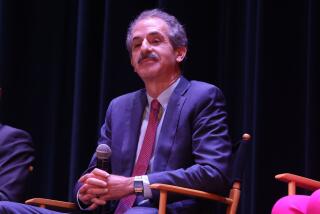L.A. County demands journalists’ sources while refusing to release records, Times lawyers allege

A Los Angeles County judge is expected to hear arguments Tuesday over whether Times reporters should be protected from revealing the identity of sources and other unpublished information in an ongoing lawsuit over the county’s refusal to disclose government records.
The newspaper alleges in court papers that county attorneys demanded unnecessary evidence from the journalists who had requested records from the Sheriff’s Department and district attorney’s office. The Times argued that unpublished information is protected by California’s Shield Law and should not be disclosed to satisfy the county’s demand for pretrial evidence.
The county “has sunk to a new low in its efforts to obstruct access to public records,” Times attorneys Jeff Glasser and Kelly Aviles wrote in a court filing. “The county seeks to invade the constitutionally protected rights of journalists with utterly unnecessary discovery demands.”
Geoffrey Sheldon and Sarah Lustig, attorneys for L.A. County, argue in a brief that they are “not seeking reporters’ notes or information regarding any unpublished story reporters may be considering writing.” They also contend that the Shield Law does not protect journalists from answering questions in pretrial litigation.
The hearing before Superior Court Judge Mary Strobel is related to a lawsuit filed by The Times last year in which the newspaper accused L.A. County of repeatedly and routinely flouting laws designed to ensure government transparency.
The suit claims that county officials refused to release records about the status of homicide investigations, investigations of sexual misconduct by prosecutors and even mundane information such as work email addresses for Sheriff’s Department employees.
In their request for a protective order, The Times’ lawyers said the county had demanded documents from the newspaper that would show why reporters submitted the requests and who tipped them off. In several instances, the county asked The Times to “identify all witnesses or persons who have knowledge” supporting the newspaper’s claims in its lawsuit.
Open government advocates called any attempt to obtain such information from reporters as unprecedented and said such a move could spur other agencies to follow suit to prevent the release of public records and undermine California’s open records laws.
David Snyder, executive director of the First Amendment Coalition based in San Rafael, said he is not aware of another government agency in California using a similar strategy to fight a media lawsuit seeking access to public documents and data.
“It really smacks of an effort to simply delay the release of public records, run up litigation costs and frankly harass journalists and their publication,” Snyder said. “The information the county is seeking is clearly protected by the Shield Law.”
Terry Francke, general counsel for open records advocacy group Californians Aware, said he thinks a ruling in favor of the county would likely be overturned by a higher court. But he is concerned that such an aggressive legal strategy could be copied by other government bodies.
“One effect might be that the lawyers for public agencies elsewhere in California might see this as a way of slowing down the local press appetite for their records,” Francke said. “It would be more likely to inspire slash and burn attorneys.”
Sheldon and Lustig could not be reached for comment Monday.
The California Public Records Act, like similar laws around the nation, was designed to ensure voters and taxpayers can quickly access the volumes of documents and data generated by public employees every day.
With limited exceptions, such laws make information such as city contracts with vendors, local government payrolls and the written correspondences of public officials open to inspection. The idea is to ensure transparency, but there is a constant tension between the public’s right to know and government officials’ concerns over privacy and other exemptions to the law or attempts to avoid embarrassment.
In the suit filed in March 2018, Times attorneys accused county officials of issuing “baseless denials” of requests over the years. The county denies violating state records laws.
Among the records at issue in the suit are files involving prosecutors and other employees of the district attorney’s office who have been disciplined for sexual harassment or misconduct.
The request for those records, filed in February 2018 by reporter Marisa Gerber, is timely because the district attorney’s office is reviewing whether to file charges in high-profile cases of celebrities, such as Hollywood producer Harvey Weinstein, who is accused of sexual assault and similar misconduct.
In 2017, the California Legislature released similar records of 18 cases of alleged sexual harassment involving lawmakers and their employees. Those cases included the sharing of pornography and a staff member accused of grabbing a woman’s buttocks and genitals.
The records, which had been shielded for more than a decade in some cases, became public after three months of requests from Times reporters and attorneys.
More to Read
Start your day right
Sign up for Essential California for news, features and recommendations from the L.A. Times and beyond in your inbox six days a week.
You may occasionally receive promotional content from the Los Angeles Times.







